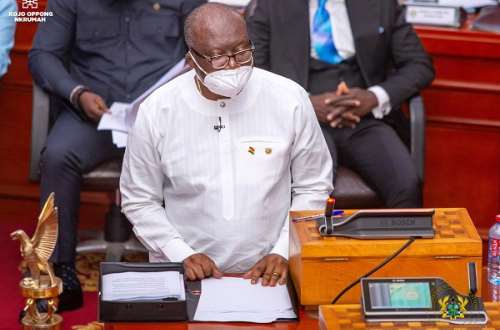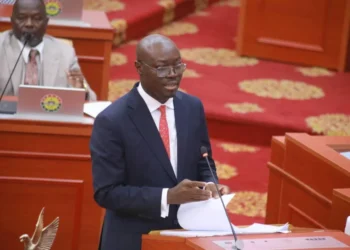Finance Minister, Ken Ofori-Atta, has blamed the current economic challenges on the controversies that surrounded the passage of the 2022 budget statement.
According to him, the budget presented in November last year, outlined significant revenue measures to tackle the country’s fiscal difficulties, finance the transformative agenda of Government and sustain the post COVID-19 recovery.
“However, what started as a political disagreement over revenue measures in this House, triggered a series of events that significantly undermined the credibility of our budget, consequently leading to serious economic challenges, as investor confidence hit a new low.
“This manifested in credit rating downgrades which triggered the closure of Ghana’s access to the International Capital Market; tightening domestic financing conditions; and increasing cost of borrowing. The combined effects of the developments contributed to the rapid depreciation of the cedi and compounded the high debt service levels.”
Hon. Ken Ofori-Atta
Hon. Ken Ofori-Atta explained that Ghana’s inability to access the International Capital Markets meant that, “for the first time in our administration, we did not have the needed foreign currency to complement our forex earnings”.

“We have had to make strenuous efforts to meet our import bill, which exceeds US$10.0 billion annually. Considering our low foreign earnings, it has been difficult to meet our import requirements including crude oil and petroleum products of about US$400m (GHc4.80 billion) a month. At the same time, Ministry of Finance still needs to find about US$1.0 billion annually to keep our lights in our homes and workplaces.”
Hon. Ken Ofori-Atta
Fast depreciation of the Cedi
The Finance Minister intimated that the demand for foreign exchange to support the unbridled demand for imports undermined and weakened the value of the cedi.
This, he said, contributed to the depreciation of the cedi, which has lost about 53.8 percent of its value since the beginning of the year. Compared to the average 7 percent average annual depreciation of the Cedi between 2017 and 2021, the current year’s depreciation, which is driving the high costs of goods and services for everyone, is clearly an aberration – a very expensive one, he exclaimed.
Mr. Ken Ofori-Atta stated that the increases in fuel prices (Diesel, currently GHS20.5 and Petrol GHS16.8) has led to increases in prices of most goods and services. He underscored that though government managed to bring down inflation from 15.4 percent at the end of 2016 to 7.9 percent at the end of 2019, it is now 40.4 percent.
“It is not only the individuals and households who are adversely affected by the depreciation of the cedi. For us at the Ministry of Finance, the depreciation of the cedi seriously affects our ability to effectively manage our debt. Indeed, our stock of debt has increased by GHc93 billion this year alone due to the depreciation of the cedi since the beginning of 2022.
“Even as the State struggles to raise sufficient revenues, high inflation rates continue to eat away the already meagre wages of the average Ghanaian. The lesson from this relapse in macro-economic stability makes us even more determined, as your government, to permanently restructure and transform this economy and build resilience.”
Hon. Ken Ofori-Atta
The government “empathize greatly with all Ghanaians for the undue pressures this has placed on their livelihoods” and commended all for their “forbearance during these difficult times”. The Finance Minister is “confident that together, and with God on our side, we will turn things around”.
READ ALSO: Government To Invest GH¢50million To Boost The Agricultural Sector Of The Economy – Ken Ofori Atta























